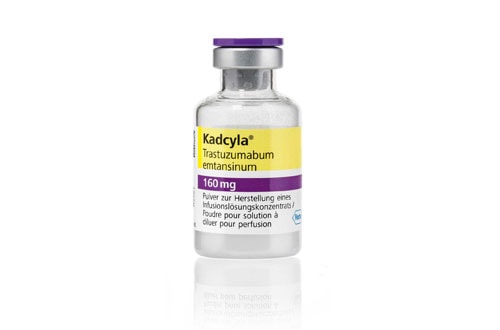
Cancer patients could be denied access to expensive new treatments such as Roche’s Kadcyla
NHS England has published a list of 25 medicines across 42 oncology indications that it will re-evaluate for use on the Cancer Drugs Fund (CDF).
The re-evaluation could mean cancer patients in England are denied expensive new treatments like Roche’s Kadycla (ado-trastuzumab emtansine) and Avastin (bevacizumab) if experts determine that their effectiveness does not justify their cost.
The price assessment is part of plans to reshape the CDF, which was set up by the Coalition Government in 2010 with an initial budget of £600m across three years to pay for cancer drugs not recommended by the National Institute for Health and Care Excellence (NICE) for routine NHS reimbursement.
The Government has since extended the CDF’s run and boosted its funding by an additional £80m a year up to the end of March 2016.
When announcing the extension of the Fund NHS England also said it would revise the way the CDF functions, including the introduction of an assessment in order to remove drugs with the “lowest levels of clinical benefits”.
These plans have now been published by NHS England in what it describes as the “first step in securing the sustainability of the fund”.
The guidance states: “Drugs on the national list will be subject to an affordability test within the overall CDF budget, being added or removed according to their relative aggregate score using the national CDF Prioritisation Tool of clinical benefit in conjunction with the assessment of drug cost per patient.
“Drugs whose aggregate score is below the threshold applicable at the time will not be added/will be removed from the list.”
Drugs up for review for use on the Cancer Drugs Fund
| Company | Drug | Indication |
| Bayer | Stivarga (regorafenib) | Sarcoma |
| Bristol-Myers Squibb | Sprycel (dasatinib) | Leukaemia (2 indications) |
| Celgene | Abraxane (paclitaxel) | Pancreatic cancer |
| Imnovid (pomalidomide) | Myeloma | |
| Revlimid (lenalidomide) | Myeloma | |
| Eisai | Halaven (eribulin) | Breast cancer |
| Gilead Sciences | Zydelig (idelalisib) | Chronic lymphocytic leukaemia |
| GlaxoSmithKline | Arzerra (ofatumumab) | Chronic lymphocytic leukaemia |
| Tyverb (lapatinib) | Breast cancer | |
| Votrient (pazopanib) | Sarcoma | |
| Janssen | Caelyx (doxorubicin hydrochloride) | Sarcoma |
| Velcade (bortezomib) | Lymphoma (2 indications ), myeloma (2 indications) | |
| Lilly | Alimta (pemetrexed) | Lung cancer (2 indications) |
| Merck KGaA | Erbitux (cetuximab) | Colorectal cancer (3 indications) |
| Mundipharma | Levact (bendamustine) | Lymphoma |
| Novartis | Afinitor (everolimus) | Breast cancer, neuroendocrine tumours, renal cancer |
| Pfizer | Bosulif (bosutinib) | Leukaemia (3 indications) |
| Inlyta (axitinib) | Renal cancer | |
| Xalkori (crizotinib) | Lung cancer | |
| Roche | Avastin (bevacizumab) | Breast cancer, colorectal cancer (2 indications), ovarian cancer, paediatric cancer |
| Kadcyla (trastuzumab emtansine) | Breast cancer | |
| Perjeta (pertuzumab) | Breast cancer | |
| Sanofi | Jevtana (cabazitaxel) | Prostate cancer |
| Zaltrap (aflibercept) | Colorectal cancer | |
| Takeda | Adcetris (brentuximab vedotin) | Lymphoma (3 indications) |
The list of drugs – known as the CDF Cohort Policy List – will be reviewed on a quarterly basis, with the first meeting to be held in December. The first decisions on what drugs remain or are added to the list are to be published in early 2015.
The new process is a point of concern for pharma companies, who risk losing an alternative route to UK patients if a drug is turned down by NICE.
The third sector was more positive about the announcement, although concerns remain that patients will lose access to treatments that offer significant benefits.
“It’s encouraging to see that changes are being made to improve the way that the Cancer Drugs Fund operates and make better use of the money available,” said Caitlin Palframan, senior policy manager at Breakthrough Breast Cancer, a charity that has been vocal in the need for a rethink of cancer drug reimbursement in the UK.
“However, we’re deeply concerned that several very effective breast cancer drugs appear on the list of drugs at risk of delisting due to their high price.
“The Cancer Drugs Fund was only ever intended to be a temporary solution, acting as a safety net for patients, but we are now facing a situation in which it may fail to perform that function for some people and more and more life-extending drugs could be snatched away from those that need them.”
Palframan reaffirmed Breakthrough Breast Cancer’s call for all political parties to commit within their manifestos to finding a long-term solution to cancer drug pricing, which is sure to be a contentious issue in what is set to be an election year.




